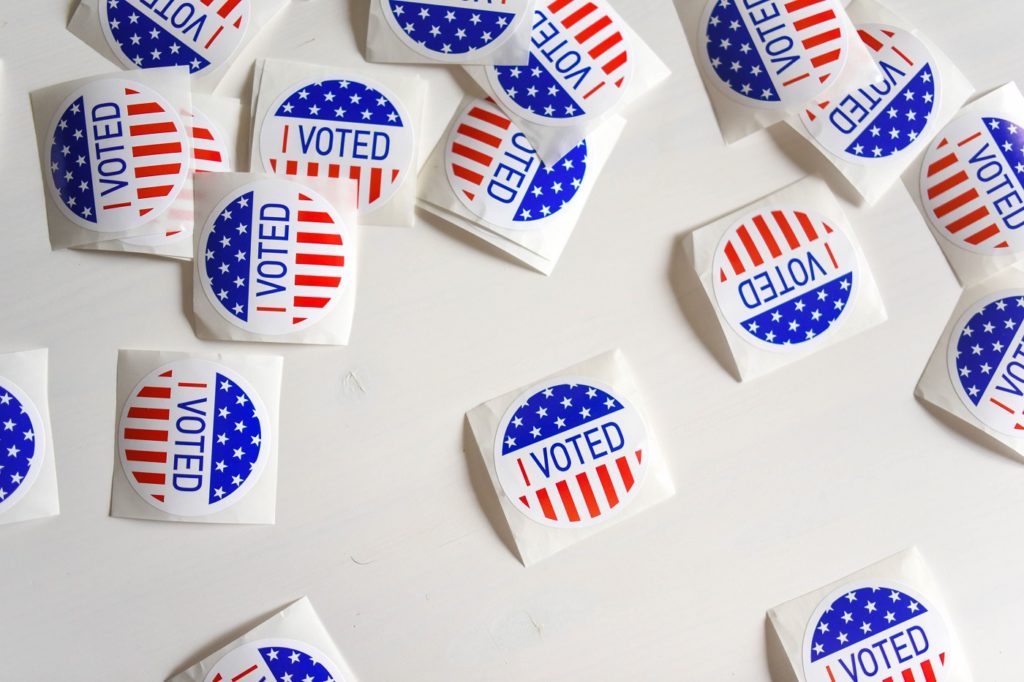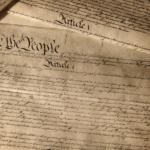This week, Public Discourse is running a symposium on the 2020 presidential election. We’ll hear from authors with a wide variety of perspectives on the difficult prudential question of how social conservatives should vote this November. Although they come to very different conclusions, these authors all share a core commitment to Biblical and natural law morality. We hope the essays serve to inform your own decision. –The Editors
Sixteen years ago, Alasdair MacIntyre famously argued that “the only vote to cast” in the race between George W. Bush and John Kerry was to “vote against the system” by not voting at all. At the time this view seemed eccentric: the political situation, despite its evolution since the Era of Reagan and the acceleration of its transformation after September 11, remained grounded in a more or less respectable liberalism.
Of course it was precisely that respectable liberalism—or rather the façade that hid the ruins of justice—that MacIntyre wanted to undercut. And while his view of the stakes in 2004 might have appeared overstated at the time, who could deny now that he saw a moral and structural weakness in our politics that many could not?
MacIntyre’s case then was simple and has been repeated many times over the years: the Republicans are (at least nominally) right on abortion, and wrong on economic justice; the Democrats are (at least nominally) right on economic justice, and wrong on abortion. And the system that pits these essential aspects of the common good against one another does not deserve to be propped up by our guileless participation.
Start your day with Public Discourse
Sign up and get our daily essays sent straight to your inbox.But what about our guileful participation? What about a vote that fully recognizes the terrifying absurdity of the options and the bankruptcy of the system that has presented them to us?
Clarifying the Duty of Voting
I do think there’s a defensible case for voting for either Donald Trump or, more tenuously, Joe Biden. Either would be a vote of strategy less than principle, of harm-reduction less than supporting a positive program. If you feel called to cast such a vote, I’d suggest not making a big show of it: the personal and political vices of these men are objectively scandalous, and the reasoning needed to justify supporting either of them is far too delicate for a bumper sticker, or worse, a tweet.
But this is not the course I would recommend, nor is it the course I plan to take in November. Rather, I plan not to vote for anyone for president of the United States.
Is it morally licit to abstain? The Catechism of the Catholic Church presents a challenge here: Within its discussion of the duties of piety implied in the Fourth Commandment, it lists the duties of citizens: “Submission to authority and co-responsibility for the common good make it morally obligatory to pay taxes, to exercise the right to vote, and to defend one’s country.” Importantly, though, the Catechism does not assert an obligation to vote in every race in every election. Certainly there are duties to friends, family, and faith that might keep us from the polls. And after all, it would be senseless for the obligation to vote to be more binding than the obligation to assist at Mass.
Rather, there is an obligation “to exercise the right to vote” as an essential part of “co-responsibility for the common good.” And so we should vote where and when we can; but, as the United States Conference of Catholic Bishops has clarified, our options also include “the extraordinary step of not voting for any candidate.” And so the question becomes: In the coming election, what course best fulfills our duty to the common good?
The Soul of the World
The second-century Epistle to Diognetus includes one of the most striking extended metaphors in Christian theology:
What the soul is in the body, Christians are in the world. The soul is dispersed through all the members of the body, and Christians are scattered through all the cities of the world. The soul dwells in the body, yet is not of the body; and Christians dwell in the world, yet are not of the world. . . . The soul is imprisoned in the body, yet keeps together that very body; and Christians are confined in the world as in a prison, and yet they keep together the world. . . . God has assigned them this illustrious position, which it were unlawful for them to forsake.
The Catechism actually quotes that last sentence in its commentary on the relationship between the Christian and the civil order: the Christian’s position is privileged, not in the sense of possessing worldly power, but in the sense of possessing the supernatural support of grace, which he must put to dignified use. As possessors and communicators of grace, Christians do nothing less than maintain the integrity of the world, as the soul maintains the integrity of the body.
In democratic societies that are functioning reasonably well, the Christian fulfills this duty in two ways by participating in the electoral system. First, by the act of voting itself he supports the constitution (more unwritten than written) of the society of which he is a member. The assimilation of the Christian into his society in all acceptable matters is also famously discussed in the Epistle to Diognetus: “For the Christians are distinguished from other men neither by country, nor language, nor the customs which they observe. For they neither inhabit cities of their own, nor employ a peculiar form of speech, nor lead a life which is marked out by any singularity.”
Second, he applies his informed conscience to selecting the candidates, movements, and platforms most likely to maintain, or better, to advance the integrity of his society. Integrity here means more than mere social cohesion, though that is part of it; rather it means the harmony of the society and its laws with the natural law and the divine order. The fruit of this integrity is peace, which is, in a word, the temporal common good.
Assessing the Present Options
We are faced now, however, with a situation where no major candidate, party, or popular movement associated with a candidate or party, will plausibly maintain or advance the integrity of our country. Joe Biden is the figurehead of a movement that, among other enormities, will further dismantle intergenerational solidarity through abortion and euthanasia; and that refuses to tolerate, or even to attempt to understand, its opponents. And Donald Trump has managed to advance most of the bad impulses of populism and few of the good ones, stoking historic animosities to excite the aggrieved while further entrenching the rich and ignoring the poor. There is no option to “keep together the world;” there are only candidates who would intensify, and attempt to profit from, its disintegration.
There is no option to “keep together the world;” there are only candidates who would intensify, and attempt to profit from, its disintegration.
Further, in a society that has spurned the only force, divine grace, that can truly restore the frayed bonds of brotherhood, we can have no reasonable expectation that the situation will soon improve. Identity politics of the left and, increasingly, of the right will continue to poison our imaginations, leaving us unable even to conceive of genuine solidarity and goods that are shared by all. The only solution to historic and ongoing injustice will appear to be retribution rather than reconciliation, domination rather than reparation. Secularism will, like relativism, continue to be shown to be an unstable state, and new truths attached to new idols will proliferate and demand obeisance. And all of them will be false.
Choosing not to pick a side now, in this presidential election, will be good moral preparation for the further breakup to come. Now is the time to cut ties with allegiances that, as the stakes are continually raised, will only ask for more compromises with truth and charity in order to maintain a tenuous grasp on power used mostly for wickedness. Now is the time to try, in some small way, to keep this world together by different means.
Politics Is More Than Voting
To be clear: not to vote is not to abandon politics. First of all, politics merely describes the organization of our common life, not necessarily partisanship and electoral scheming. We can be political in every way from building small communities of trust and service to building alternative institutions that aspire to transform a city, a state, or even the nation. And second, we can be political in the more common sense in every way from joining local committees, to trying to influence a major party’s trajectory, to positioning ourselves within the less strictly partisan organs of the state.
But none of this requires throwing in with either of the present options on the table. And if, by some combination of hard work and divine favor, a genuinely justice-oriented Right, or (per impossibile) a genuinely pro-life Left, or some completely different common-good movement emerges, then we can get right back in the game, and in good conscience and with good cheer support a movement that at least aspires to restoring the integrity of our civilization.
For now, though, our duty is to be the soul—even more specifically, the conscience—of our civilization by saying simply, “No.” The options this November, and the trajectories they promise, are not acceptable, and in choosing between them we risk forsaking our calling by soiling our witness. We serve our nation best by being, as far as we possibly can, its pure soul, and not by embracing its corruption.














